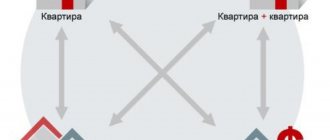How to change an apartment if a minor is registered
The main difficulty in the issue of exchange involving minor children is related to the discharge of the child. The other party to the transaction is unlikely to like the option of exchanging real estate with a tenant in addition. Moreover, unlike adults, the new owner of the apartment will not be able to discharge the child even through legal proceedings, so no one will agree to such an exchange.
Before exchanging an apartment with a minor, you need to find out all the details and nuances of the transaction. For example, you should be wary if the apartment chosen for exchange has been resold several times over the last 1-2 years. Also remember the following subtleties:
- According to the Housing Code of the Russian Federation, the seller of real estate must transfer ownership rights to the buyer. In case of exchange, the same rules apply.
- To give legal force to a contract, it must be concluded in writing and all parties sign the document.
- The contract must be registered with government authorities so that ownership rights are transferred to the new owner. This also applies to exchanging apartments with minor children.
- When one of the parties refuses to register a transaction, the other party may file a lawsuit. In this case, the culprit compensates for losses incurred by the other party as a result of the delay in the registration procedure.
How to exchange apartments with a minor child
The exchange of shares or the exchange of entire apartments is carried out in a certain sequence. In each case, mandatory documents are required, namely:
Articles on the topic (click to view)
- Legal assistance to orphans
- What to do legally if a mother does not pay child support
- Conditions and documents for obtaining a plot of land for a third child in 2021 in Moscow
- Conditions for receiving and amount of maternity capital for a second child after 2021
- Federal Law 159 on additional guarantees for social support for orphans
- Fixed child support under the new law of 2021 if the father works
- Form of agreement on payment of alimony for a minor child: sample 2021
- a statement from the parents of a minor about the planned transaction;
- written consent of children if they are over 14 years old;
- an extract from the house register, a child’s birth certificate with a copy;
- results of apartment assessment from BTI with cadastral plan;
- documents/certificates confirming the rights of a minor child to housing;
- a document confirming a valid reason for the absence of one of the parents (if the transaction is concluded only by the father or mother);
- certificates from the tax service.
If the child is not the owner of the apartment that is being prepared for exchange, but is simply registered in the living space, the guardianship authorities may require that he be immediately registered in the new house.
Legal advice, assistance in Novokuznetsk
In addition to the above papers, documents must be submitted that confirm the relationship between the child and the parents acting as applicants. The inspector of the guardianship authorities may request a specific package of documents, it all depends on the situation under consideration and the creative imagination of the inspector. To avoid getting into trouble, visit the inspector first, explain the current situation and clarify the list of documents that will be required to obtain consent. This step will eliminate any unpleasant surprises that arise during the transaction process.
There are no categorical restrictions when exchanging a privatized apartment. In this case, all emerging obstacles to exchange are of a so-called situational nature. Let's focus on legal restrictions and not go into the commercial side of the issue, the main essence of which is determined by the sufficiency of the market value of the exchanged object. The price or the possibility of additional payment should suit those leaving for the subsequent purchase of other apartments.
How to coordinate an operation?
When a full exchange or exchange of shares with a minor child is made between relatives or strangers, and the child is not the owner, no approvals are required.
The main thing is to deregister the child with the Federal Migration Service in advance and immediately register it in a new place (you can at the address of friends or relatives). A similar procedure with a minor is carried out by one of the parents, since children have no right to live without a family by law.
You can find out how to exchange an apartment with your parents at a real estate agency where experienced realtors work. In the case when a child is not yet 14 years old, he is incompetent, that is, all documents are signed for him by his parents or guardians. Children over 14 and under 18 years old, if they have a certificate/passport, participate in transactions themselves.
The Votchina real estate agency will help you properly exchange an apartment if you have children who own it, and will also provide the full range of real estate market services. We are often approached with similar questions, and over the 18 years of our existence we have accumulated extensive experience in this field. Also contact us if you need to check the apartment before purchasing for legal purity.
How to exchange shares in an apartment if the owners are minors?
We have a room in a communal apartment, purchased with maternity capital. 5 owners, 3 of them are minor children. My husband has a three-room apartment where we all live. He is the only owner. Can we make a transaction to exchange shares in such a way that the husband becomes the sole owner of the room, and in the apartment we have all 5 owners in equal shares? What is this deal called? What is needed for that?
In accordance with Part 4 of Art. 10 of Federal Law No. 256-FZ of December 29, 2006 “On additional measures of state support for families with children”
Residential premises acquired (built, reconstructed) using funds (part of the funds) of maternal (family) capital are registered as the common property of parents, children (including the first, second, third child and subsequent children) with the size of shares determined by agreement.
Thus, first you need to purchase residential premises using maternity capital and distribute shares in ownership between the parents and all children.
After the official registration of the purchase and sale of a room with the distribution of shares, you have the right to exchange shares between you, your spouse and children, so that the husband becomes the sole owner of the room, and the apartment is distributed among all family members.
It is best to exchange shares in rooms and apartments under a gift agreement, since this transaction between immediate relatives is not subject to tax. As a general rule, when alienating shares owned by minors, the consent of the guardianship authorities is required.
A way to solve family problems: sharing an apartment with minors and parents
- Through a notary – 3 working days; the cost of services consists of a fixed part, the cost of technical work and a percentage of the transaction price (varies from 0.3% to 1%). The fixed part and technical services may be different for each notary.
- Through the office and website of Rosreestr - 10 working days; the amount of state duty will be 2000 rubles; The cost of calling a Rosreestr employee to your home is different in all regions.
- Through the MFC - on average 13-15 working days; You only need to pay the state fee (2000 rubles).
- Delivery times are quite difficult to determine; this method of registering the transfer of property can hardly be called reliable; the cost of Russian Post services depends on the weight of the envelope with documents (300-1000 rubles).
- The owner has the rights to own, use and dispose of his property.
- The owner has the right, at his own discretion, to take any actions in relation to his property that do not contradict the law and other legal acts and do not violate the rights and legally protected interests of other persons, including alienating his property into the ownership of other persons, transferring to them, while remaining the owner, the rights possession, use and disposal of property, pledge property and encumber it in other ways, dispose of it in any other way.
- Possession, use and disposal of land and other natural resources, to the extent that their circulation is permitted by law (Article 129), is carried out by their owner freely, if this does not cause damage to the environment and does not violate the rights and legitimate interests of other persons.
- The owner can transfer his property into trust management to another person (trustee). The transfer of property into trust management does not entail the transfer of ownership rights to the trustee, who is obliged to manage the property in the interests of the owner or a third party specified by him.
Exchange or sale of property interests of minor children
Hello, I ask you to express your qualified opinion on this situation.
The question may seem repetitive, but unfortunately the examples described on the site are somewhat different from this situation.
A family (father, mother, two children) each has 1/4 of the common shared ownership in an apartment (50 sq. m.) in one of the cities of Moscow Region.
This is important to know: Power of attorney to pick up a child from kindergarten or camp: sample
A question arose about the sale of an old apartment in which two children have 14 shares (12.5 meters each).
We contacted the guardianship authority with a question: Can a parent who has a share in a large apartment exchange shares with their children on the condition that the children receive more square meters than they previously had (for example, 15 square meters or more). The guardianship authority responded that such a transaction was impossible under Article 37 of the Civil Code. It is possible to sell children's shares only when purchasing alternative real estate, and it is possible to exchange children's shares only with the participation of non-close relatives in the transaction.
A situation arises in which the apartment simply cannot be sold (the family does not have the opportunity to buy their children another property as an alternative. An exchange between parents and children is impossible). And in another city, the family does not need an apartment due to moving.
Are there legal ways to exchange shares with your children, provided their situation improves? And also, in this situation, is it possible to somehow use the fact that the family is moving to another city?
Thank you in advance for your response! Michael
?Good afternoon. As follows from Article 20 of the law on guardianship and trusteeship, a transaction with the real estate of a minor must be made for his benefit, including exchange. Therefore, as a result of such a transaction, the minor must acquire more than he previously had. Thus, its share both in meters and in assessment should be greater. It is necessary to assess the share belonging to the child and give him a correspondingly larger one. Submit the relevant supporting documents to the guardianship, including the preliminary exchange agreement or draft. But if there is still a refusal, then it is quite possible to appeal it in court, and you may need a lawyer, then hire one.
Article 20. Features of the disposal of real estate belonging to the ward?
3) alienation under a barter agreement, if such an agreement is made for the benefit of the ward;?
How can you change an apartment in any situation?
- written consent of all persons registered in the living space, certified by a notary;
- permission from the property owner (municipality or other government body);
- social rental agreement (if there is only a warrant, you must contact the housing department of the municipality to obtain an agreement);
- a certificate from the Housing Office about registered residents;
- certificate of absence of debts for utilities.
Privatization of housing presupposes the ability to dispose of it at your own discretion, including selling or exchanging it. Therefore, such an operation will be impossible only in one case, if the property has several owners and one of them does not agree to the transaction.
Sale of an apartment with a share owned by minors
My military husband (retired) received an apartment from the state in the city of Sosnovy Bor with an area of 72 sq.m. 1/4 for all family members (18 square meters each) - we have two minor children. We decided to sell an apartment in the city of Sosnovy Bor. My wife has an apartment in the city of Stavropol, which she inherited. The children are registered in it. (Where we live) Its area is 66 square meters. We contacted the guardianship authorities of the city of Stavropol. We were offered to draw up an exchange agreement. One party to the agreement is me and the children, and the other party to the agreement is my wife. At first, the guardianship authorities suggested we just want to exchange the children’s shares in the exchange agreement (in Sosnovy Bor, 1/4 each (18 sq.m.) for shares in an apartment in Stavropol, 1/3 each (22 sq.m.), but the notary said that this is impossible, we need to exchange apartment for apartment , that is, my wife cedes an apartment to me and the children in the city of Stavropol, and the children and I completely cede to her an apartment in the city of Sosnovy Bor, we receive all ownership rights and she sells it without any problems. We are in doubt whether it would be correct to draw up such an exchange agreement. After all, we are all close relatives under the same surname. Will Rosreestr let it through and will there be any problems with the sale in the city of Sosnovy Bor? Or is it better to exchange only the shares of the children? Dear lawyers, please tell me how best to proceed correctly in this situation? (must submit a report to the guardianship authorities before September .)Or look for other options.
To put it mildly, a strange decision was proposed to you by the guardianship authorities, since transactions between parents and minors, other than donations, are contrary to the law.
I believe that the notary and Rosreestr have the right to refuse to legalize such a transaction.
Article 37. Disposal of the property of a ward
3. A guardian, trustee, their spouses and close relatives do not have the right to enter into transactions with the ward, with the exception of transferring property to the ward as a gift or for free use, as well as to represent the ward when concluding transactions or conducting legal cases between the ward and the spouse of the guardian or trustee and their close relatives.
You can require the consent of the guardianship authorities with the condition that the children purchase residential premises equal to their shares with the funds from the sale of the children’s shares placed in a special account.
The wife can transfer her apartment to one of her distant relatives or third parties whom you trust. And then buy this apartment for the children, if you don’t want to buy another apartment.
Sincerely! G.A. Kuraev
Submit an official application to guardianship in order to receive an official decision in which you offer to give consent to the alienation of the apartment with the shares of minors with the condition that the children acquire equivalent living space in the future.
Since the children have another place to live permanently, consent can be given.
In the future, you will offer guardianship a deal to purchase real estate for your children.
I will support my colleague Kuraev regarding the guardianship’s not entirely clear proposal regarding transactions with the ward. They are expressly prohibited by Art. 37 of the Civil Code of the Russian Federation and therefore, even though it will be an exchange (which represents two purchase and sale transactions), it falls within the specified restriction.
Transactions for compensation between minors and their legal representatives are prohibited, regardless of whether children are the acquirers or alienators of property. Therefore, legal representatives can only give the child their real estate (or a share in the right of common property), that is, they can enter into gratuitous agreements that entail an increase in their property.
In addition, it should be taken into account that such transactions are subject to mandatory notarization, regardless of the age of the minor. Failure to comply with the notarial form of the transaction entails its nullity (clause 1, clause 2, clause 3, article 163 of the Civil Code of the Russian Federation; part 2, article 54 of the Law of July 13, 2015 N 218-FZ).
You can ask the guardian for permission to sell an apartment in Sosnovy Bor under a condition, that is, with the obligation to purchase the children equivalent to the lost housing. However, it is difficult to say whether such consent will be given.
Unfortunately, in view of this unconditional restriction, funds received from the sale of an apartment in which minors have shares of property can only be used to purchase other equivalent real estate. The most logical option is to transfer the apartment in Stavropol to other persons before selling the apartment in Sosnovy Bor (sale, donation) and after that make an exchange transaction with the consent of the guardianship, or as colleague Kuraev suggested - first sell the apartment in Sosnovy Bor with the consent of the guardianship with the money credited to special account, sell an apartment in Stavropol to other (trusted) persons and purchase it in the name of the children using the proceeds from the sale of funds in the special account.
All other cases will not be legitimate.
In this case, according to the first option. Are there any trusted grandparents or trusted brothers and sisters? Re-register an apartment in Stavropol for them and exchange shares since you have received guardianship consent to the exchange.
This is important to know: Claim to terminate the collection of alimony for child support: sample
All options for exchanging apartments - is it possible to exchange municipal and social housing?
Russians who want to exchange housing should know which categories of objects cannot be exchanged.
These include:
- Emergency housing, since the owners of such premises are subject to relocation.
- Service living quarters. In the last article we talked about how to privatize and become the owner of official housing.
- Dorm rooms.
- Housing with encumbrances. For example, if an arrest is made or the housing is pledged.
- Non-privatized premises. Privatized and non-privatized residential premises have different legal status, so there may be problems with the exchange. Exchange is possible only for apartments from a fund owned by the same owner.
- Municipal housing. For the exchange of municipal housing, the ban may be due to non-compliance with the standard for the provision of space or deterioration of living conditions.
As a rule, privately owned housing can be exchanged.
The legislation allows the following options for exchanging private residential real estate:
- By concluding an exchange agreement. The owner gives away his home, and in return receives several premises from the buyer, or one piece of real estate with an additional payment.
- Drawing up a chain of sales and purchase agreements. The first transaction occurs for the sale of housing, the next - for the purchase of residential premises.
- By allocating a share in the apartment for each owner with subsequent sale. Typically, a share can be exchanged for one piece of real estate.
- Making an exchange with an additional payment. The amount of money that the buyer will have to pay to the seller depends on the value and characteristics of each property in the chain of transactions.
Please note that the decision to exchange must be made by all owners . If one of the owners does not give his consent to the exchange, then the transaction can be considered illegal and invalid.
Apartment exchange: how to make a profitable deal
It is very difficult to solve such a problem on your own: you will have to look for a buyer for the apartment, and then start looking for housing for yourself. Therefore, it is better to contact professional real estate agencies. Employees will ensure that all sales and purchase agreements are concluded on the same day, and the risks of sellers will be minimized.
In case of an unequal exchange, one of the parties has to pay extra to get a new apartment. So, for example, it is difficult to exchange a two-room apartment for two one-room apartments: in order to get two full-fledged, albeit small, apartments instead of one, the seller will have to make an additional payment.
The possibility of paying extra when exchanging will allow you to purchase housing of better quality
Many Russians believe that paying extra for an exchange will allow them to get housing with better conditions. However, this is not always the case.
First of all, because the surcharge is not always expressed in monetary terms. The former homeowner can leave his furniture as additional payment. Moreover, repairs made in an apartment or house can be an additional payment. All nuances are discussed and documented.
Thus, a citizen can receive equivalent housing, but with new furniture.
In the contract concluded by the seller and the buyer, there must be a clause with additional payment . You should indicate the payment procedure, terms, and amount of additional payment.
Please note that transactions with an additional payment are only possible with privatized residential premises.
However, if the surcharge is expressed in monetary terms, then:
- One party can improve their living conditions by moving to a larger apartment or house.
- The other party receives material benefits by reducing their living space.
The parties must independently agree on the amount of additional payment.
If problems arise with this, it is better to contact an independent appraiser . He will conduct a study and make a decision on the amount that one of the parties will have to pay.
Also, turning to specialists will allow you to protect yourself from adverse consequences if you have to terminate the contract or declare the entire transaction invalid.
Where and how to look for options for exchanging an apartment so as not to be deceived - legal advice
Lawyers recommend contacting only trusted organizations that have documentation for conducting legal transactions with real estate.
To avoid dealing with scammers, you can:
- Request documents confirming the activities of a real estate agent . Never contact individuals. By transferring money to a citizen, you may not achieve a deal. Typically, the organization must be an individual entrepreneur or a legal entity.
- Ask the firm’s clients how their transactions were carried out, and how they helped in general . You can search for reviews on the Internet not on the agent’s company website, but, for example, on social networks, where the information is often true.
If you have chosen the exchange option yourself, without contacting a real estate agent, then it is better to conclude the deal with a notary or in the presence of a lawyer.
Where to start the exchange - list of documents
In order to exchange housing, it is necessary, first of all, to collect a documentation package.
It will include the following documents:
- Passports of all participants in the transaction.
- Birth certificate, if a minor is or will be registered in the housing.
- Certificate of family composition.
- Legal documents. This could be an exchange agreement, a purchase and sale agreement, a deed of gift, a court decision, a will, etc.
- Extract from the Unified State Register or certificate of ownership.
- Technical and cadastral documentation for housing.
- Certificate from the Federal Tax Service of the Russian Federation confirming the absence of debt on property taxes.
- Certificate of marriage registration or divorce if the transaction involves spouses.
- Consent of the spouse to complete the transaction. It must be notarized.
- Consent of guardianship and trusteeship authorities. Specialists must check into what conditions the minor will be resettled.
- Receipt of payment of the state duty for registering the transaction.
- Draft exchange agreement for the number of persons participating in the transaction. Also, one copy should be submitted to Rosreestr.
The procedure for transferring rights is completed only after passing the state registration procedure of the transaction with the authorities of Rosreestr of the Russian Federation . Citizens participating in the transaction must submit an application to the service and attach the concluded exchange agreement or purchase and sale agreement.
The agreement can be concluded in the presence of a lawyer or notary to avoid problems.
Exchange of an apartment where there is a minor child
QUESTION :
asked by Zamyslova Natalya Yuryevna (December 4, 2007) Hello! We have a non-privatized 3-room apartment, 82 m2, total 46 living rooms, 5 people are registered in it: mom, dad, brother, me and my 2-year-old daughter. We would all like to exchange the apartment, but my relatives agree to exchange it if I refuse privatization and divide the apartment into 4 people, but as I know, with children it is problematic to sell the apartment. How can we exchange money without violating the rights of the child? If possible, through municipal exchange and who is involved in this? Thank you.
ANSWER :
gives by "Premier" JSC Dear Natalya Yurievna! The tenant of residential premises under a social tenancy agreement, with the consent in writing of the landlord and members of his family living with him, including temporarily absent members of his family, has the right to exchange the residential premises occupied by them for residential premises provided under a social tenancy agreement to another tenant. Members of his family living together with the tenant have the right to demand from the tenant the exchange of the residential premises they occupy under a social tenancy agreement for residential premises provided under social tenancy agreements to other tenants and located in different houses or apartments. If an exchange agreement has not been reached between the tenant of a residential premises under a social tenancy agreement and the members of his family living with him, any of them has the right to demand a forced exchange of the occupied residential premises in court. At the same time, attention-worthy arguments and legitimate interests of persons living in the exchanged residential premises are taken into account. The exchange of residential premises provided under social tenancy agreements and in which minors, incapacitated or partially capable citizens who are family members of the tenants of these residential premises live, is permitted with the prior consent of the guardianship and trusteeship authorities. The guardianship and trusteeship authorities refuse to give such consent if the exchange of residential premises provided under social tenancy agreements violates the rights or legitimate interests of these persons. Decisions of the guardianship and trusteeship authorities to give consent to the exchange of living quarters or to refuse to give such consent are made in writing and are provided to applicants within fourteen working days from the date they submit the relevant applications. The exchange of residential premises provided under social tenancy agreements can be made between citizens living in residential premises located both in the same and in different settlements on the territory of the Russian Federation. The exchange of residential premises is carried out without limiting the number of participants, subject to the requirements of Part 1 of Article 70 of the Housing Code.
This is interesting: Where can you restore a travel ticket for veterans in the throat
The nuances of registering the exchange of housing - an exchange agreement or a sales and purchase agreement?
Let's consider several exchange options, taking into account the category of housing. Using examples, you can determine whether you will be able to exchange your home, and what is the best way to do it.
Exchange of municipal housing
Of course, municipal premises, especially those that have not been privatized, will be difficult to register as ownership and exchange. But if you still decide to exchange, then select the same municipal housing and contact the owner directly with an offer.
The Housing Code of the Russian Federation obliges the landlord to reissue social tenancy agreements according to the options submitted by citizens. They will pay attention to social norms, living conditions, floor space and the need for change. For example, it will not be possible to exchange housing for premises with worse conditions, or if a citizen has arrears in paying housing and communal services for housing under a social lease agreement.
Exchange of a one-room apartment
The peculiarity of exchanging one-room apartments is that citizens cannot always exchange them for several real estate properties.
The following exchange options are available:
- Allocation of shares for each owner and further sale of shares to other owners or third parties. The proceeds from the sale can be used to purchase a new home.
- Drawing up an exchange agreement for two or more residential premises with an additional payment.
- Registration of exchange of a “one-room apartment” for several rooms in a hostel.
- Sale of an apartment with investment in new housing.
As a rule, it is impossible to purchase two real estate properties for the real cost of a one-room apartment. Owners have to pay extra or accept a slight deterioration in living conditions. There are no other options.
This is important to know: What documents are needed for the adoption of a wife’s child by a stepfather
Exchange of a two-room apartment
When exchanging “kopeck piece” there are usually no problems. Since the cost of a two-room apartment is higher than a one-room apartment, the option of exchange without additional payment is really possible. But, if you are unable to buy the desired home with the proceeds from the sale of your apartment, you will have to consider the option of paying an additional fee.
An exchange option is also possible, when one owner receives cash, and the second - new housing. The exchange of “kopeck piece” can be carried out under an exchange agreement, or through a chain of purchase and sale transactions - the choice is up to the owners.
Depending on the situation and category of housing, you can choose the option for processing documents and decide what kind of agreement you will have to conclude. Of course, it is better to choose the option without additional payment, drawing up only an exchange agreement. But, if there is an additional payment, then you can conclude a purchase and sale agreement.
In any case, our lawyers will help you decide how best to organize the exchange of housing and tell you how to draw up legally competent documents.
Is it possible and how to exchange a non-privatized apartment?
- Search for possible options. Quite often it is at this stage that the exchange process ends. In addition to the fact that there are few non-privatized apartments left (see Why privatize an apartment), and there are few families willing to live together in the same area, you will also have to look for a suitable option yourself - it is not profitable for real estate agencies to do this. However, the exchange does not have to take place in one city - you can look for options in other localities.
- Preparation of documents (in particular, concluding a social tenancy agreement if there is none). You also need to make sure that there is no debt for utilities, since if there are debts, exchange will be impossible. Next, you need to collect all the required documents.
- Obtaining permission to exchange. It can be obtained from the property owner (municipality). It is also necessary to consent to the exchange of all persons registered in the apartment. If children under 18 years of age live there, permission must be obtained from the guardianship council. Problems with the board of trustees can only arise if the new housing has a smaller area than required by the standards.
- Drawing up an exchange agreement. Transactions are concluded not in Rosreestr, but in special institutions that have the authority to register exchange transactions. Based on the exchange agreement and the consent of each party, previously reached agreements are terminated.
- Registration of a social rental document for new housing.
According to the law, non-privatized housing can be exchanged, although this is not easy. Today, few such transactions are carried out due to some difficulties. Therefore, when deciding to take such a step, you need to prepare for the fact that the process will be long and difficult.
Forced exchange and exchange through court
The exchange of housing can occur through the courts. There can be many reasons for going to court, the most common is the second owner’s refusal to exchange.
There are also frequent cases when exchange through the court is carried out in relation to municipal property (Article 72 of the Housing Code of the Russian Federation).
The procedure for forced exchange of an apartment through the court is as follows:
Step 1. Evidence and documents are collected.
Step 2 . A statement of claim is being filed.
Step 3 . The claim with documents is sent to the District Court.
Step 4 . The parties to the dispute come to the first meeting to get acquainted. Additional petitions and applications may be submitted.
Step 5 . The court makes a decision. If the court determines that the proposed division is consistent with the law and the interests of all parties, the defendant will be obliged to comply with the decision.
Please note, if you want to divide private property through the court, the court may deny you this right. But division of ownership rights to shares . Each owner will decide for himself whether to sell his share or not. The court will not force him or force him to do this.
The court can also transfer the object to one of the heirs under the will. Then the new owner of the property will have to pay compensation to the remaining heirs.
Keep in mind that in the statement of claim you need to offer several options for exchanging housing and determine compensation for the sale of the property in the event of payment to another owner.
The court will not provide division options, looking for the necessary and best. Essentially, this issue should be dealt with by the plaintiff, his legal representative or the real estate agent he contacted.
Exchange of apartment during divorce
In the event of divorce, spouses can exchange housing.
This can be done in several ways:
- Through the court. It is not always possible to reach an agreement peacefully, because they want to divide one piece of real estate into two. Some spouses turn to the judicial authorities for exchange and division, offering options for resolving the controversial issue.
- Voluntarily. The exchange of an apartment during a divorce can occur voluntarily. Then the spouses turn to a notary, who records the transaction. The exchange option can be selected by a real estate agent or the citizens themselves.
How housing will be exchanged does not play a big role. The main thing is that the proposed option suits each spouse.
For example, you can:
- Exchange the apartment for two.
- Exchange the apartment for an apartment with a smaller area, and the second owner will receive monetary compensation.
- Exchange an apartment for a house. The other spouse will also be offered compensation.
- Exchange an apartment for two apartments with an additional payment.
The exchange of an apartment between spouses will be possible if it belongs to both spouses, was acquired in a joint marriage and has no encumbrances.
Features of apartment exchange
If there is a misunderstanding regarding the exchange between those living at the same address and having their own share in this apartment, then in this case the following two options are possible.
You need to find a compromise or sell your share in this apartment to one of the shareholders or a complete stranger. The latter can be very difficult to achieve; not everyone wants to live next to a stranger. For more than 20 years, real estate privatization has been taking place in Russia, which ends on March 1, 2015. But many people still cannot decide which apartment is better to live in: in their own privatized one or under a social rental agreement. And if you have to exchange an apartment, then you definitely need to know how to exchange a privatized apartment and what is necessary for this.
Sharing housing with minor children
Minor citizens, although they do not take part in the transaction, play an important role in choosing new housing and new living conditions.
The guardianship and trusteeship authorities must control which residential premises will be acquired by exchanging the old one. They must check the conditions in which the child will live - and give their consent to the exchange.
All interests will be represented by a guardianship employee , not a parent, since in some cases even parents can infringe on the rights of children. In conclusion, the specialist must describe whether the new conditions correspond to or exceed the previous ones - and, in general, whether they are suitable for the child to live in.
Guardianship authorities pay special attention to housing in which the minor has a share. For example, if housing was purchased using maternity capital, then the minor has an equal share, like the rest of the family. This means that when buying a new home, he must have the same part of the housing, no less in area and conditions. Obtaining consent from the guardianship in this case is mandatory , there are no exceptions.
How to exchange a privatized apartment
From a legal point of view, there is only one condition that must be formalized in accordance with the law in order to complete the transaction. The point is that if minors live in the exchanged apartment, then their rights must be respected. The rights of minors are protected by guardianship and trusteeship authorities. If minors live in the living space, then in order to exchange it is necessary to obtain permission from the guardianship authorities to conduct the transaction. The main factor in this matter is respect for the rights of minors. That is, their living conditions cannot be worsened as a result of the exchange. Therefore, when a buyer is found for the exchanged apartment and alternative housing is found, the next step is to go to the inspector at the guardianship and trusteeship authority.
From a legal point of view, the process of leaving depends on whether the apartment is owned (privatized or purchased) or not privatized (operated under a social rental agreement). Let's consider the option of exchange when the apartment is privatized.
We recommend reading: How to register ownership of a built house
Exchange of an apartment without the consent of one owner
In the event that one of the owners does not give his consent to exchange the apartment, it is necessary to go to court . The statement of claim should require the allocation of a share to each home owner and forced exchange.
In the claim, indicate several options for resolving the dispute, determining how the right to exchange of the other owner can be exercised.
For example , you can offer him monetary compensation, or the purchase of a new home with an additional payment, or simply an exchange for another living space.
The court cannot force a disagreeing owner to sell or exchange an apartment, especially if this is his only home. However, the court may provide the opportunity to other owners to dispose of the shares due to them, if they have not previously declared their rights.








